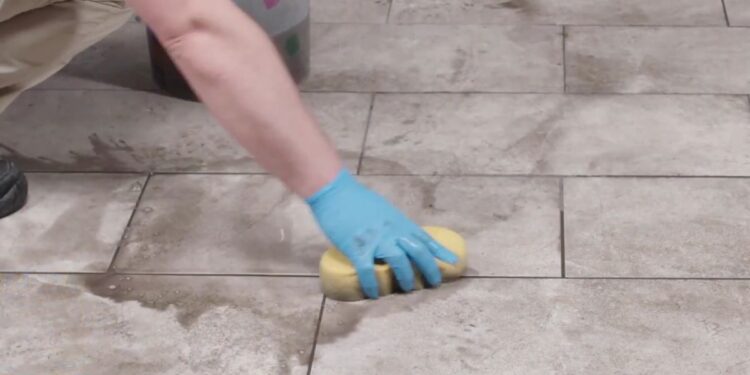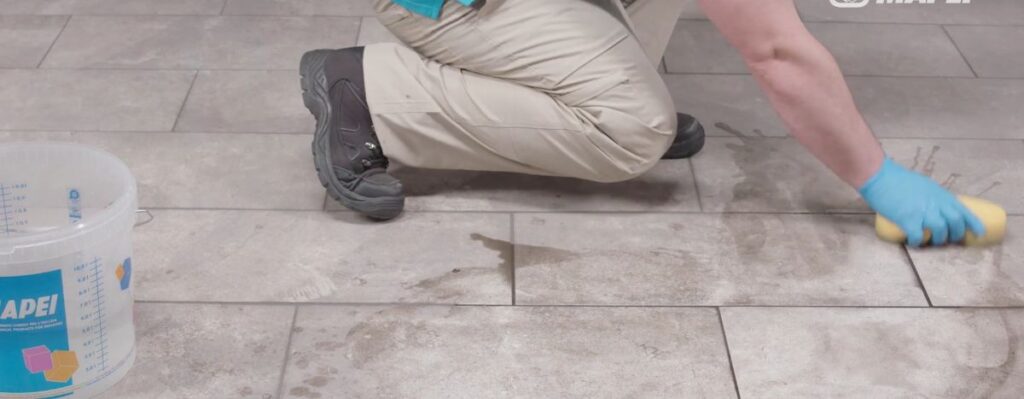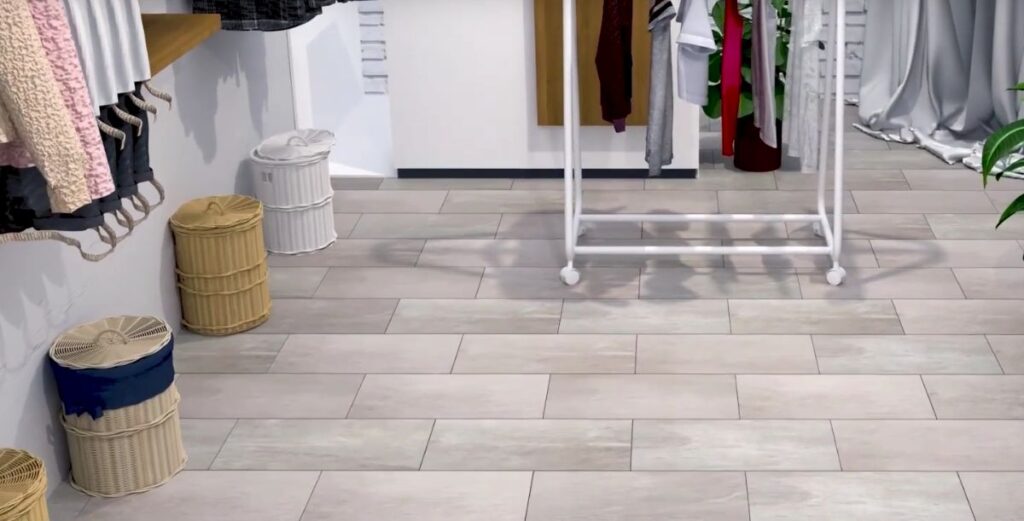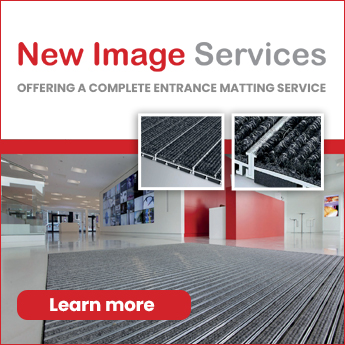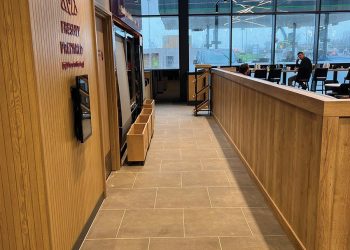We are all aware of the detail that is put into specifying a material type for a project. The client’s wishes, as well as many other aspects of the project, are considered and this influences the choice of material that ends up being installed.
The same attention to detail is also required when considering how to clean and maintain the surfaces over time.
Each type of material has different characteristics, and these characteristics influence which type of cleaning product can be used at various stages of the maintenance programme, particularly when we consider the first wash after installation and periodic deep cleaning.
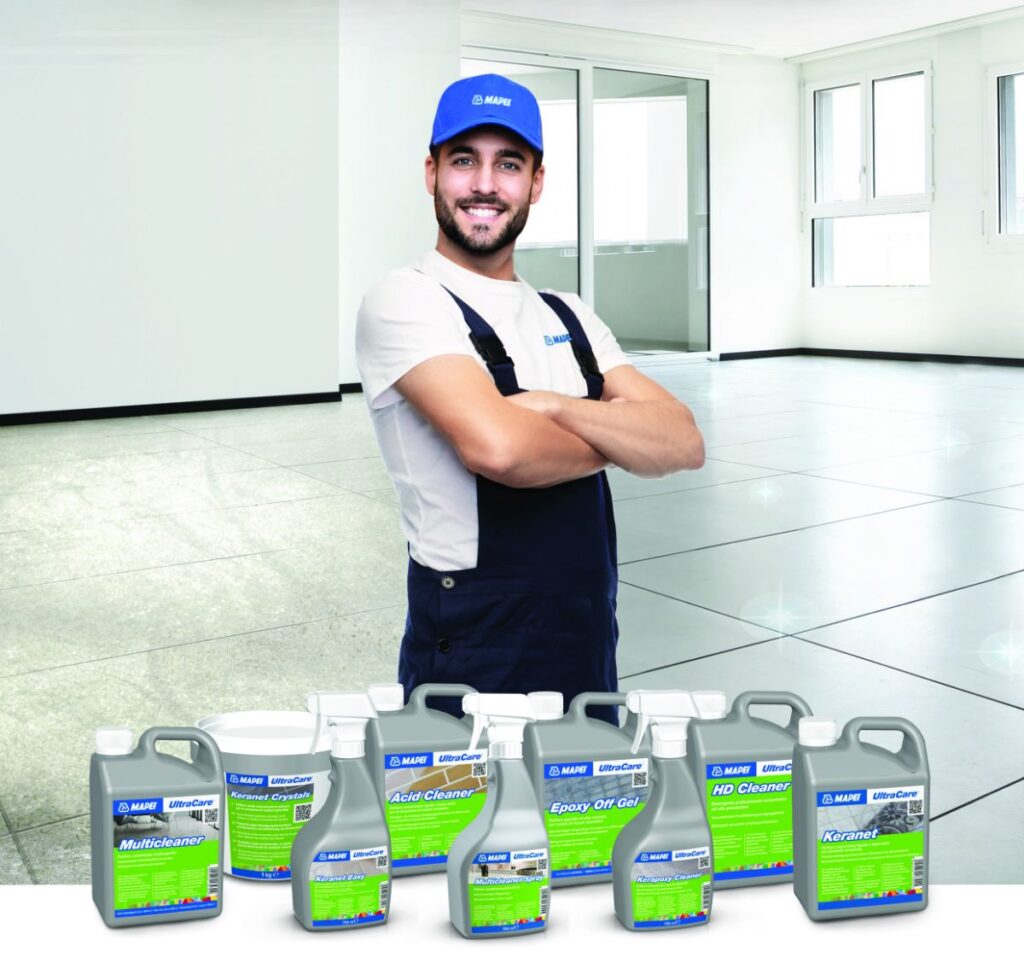
Fundamentally, the process of cleaning after installation, known as the Builders Clean, regular maintenance and periodic deep cleaning are the same but the products that are used especially for the Builders Clean are often quite different when we look at the differences between ceramic, porcelain, and the more sensitive natural stone materials. Consideration must be given to natural stone if they are sensitive to acid.
This type of stone needs to be cleaned with either a pH neutral product or an alkaline product to respect the sensitivity of the stone. However, if you need to clean an acid sensitive polished natural stone, this is best undertaken with a pH neutral cleaner.
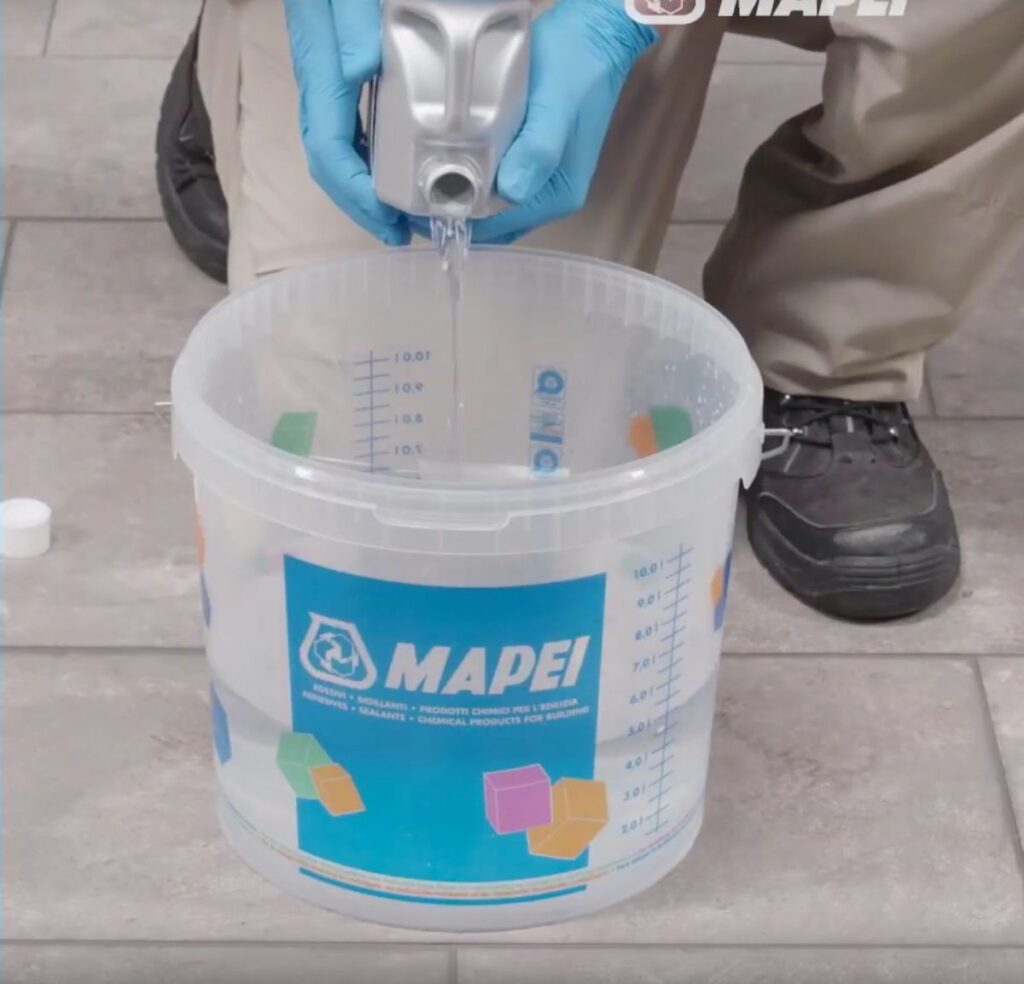
Removing grout residues
Firstly, let’s look at the care and maintenance of porcelain, ceramic and acid resistant materials.
Often during installation, adhesive and grout residues can remain on the face of the tile, even after performing a clean with a damp sponge and water. Throwing into the mix a heavily textured or an anti-slip finish can add to the amount of contamination remaining on the surface.
The action of undertaking a Builders Clean is imperative to the performance of the tile after installation, and using the correct cleaning product will ensure that the tile looks perfect, performs as expected and is easy to clean going forward.
For these acid resistant materials, an acid cleaning product is best as the acid reacts with the cementitious residues and softens it so that it can be easily removed, leaving a clean surface. When considering an acid cleaning product, it is best to consider a product that also contains a detergent, such as MAPEI UltraCare Acid Cleaner. This is because, as well as removing the cementitious residues, it will remove any organic dirt from the surface, thus eliminating the need to undertake another wash. It will also help to remove any polymer additives in the grout. This is especially important if you are installing a heavily textured or anti-slip material.
As well as these considerations, you should look for a product that has a buffered formulation, such as MAPEI UltraCare Acid Cleaner and MAPEI UltraCare Keranet. Their special formulations do not emit fumes and are therefore safe for the applicator to use, and are not damaging to the environment.
This is an important consideration as products that emit fumes can cause damage to stainless steel and aluminium profiles. So you can see from this that the choice of product to perform the Builders Clean is so important, and will have an effect on the future performance of the tile.
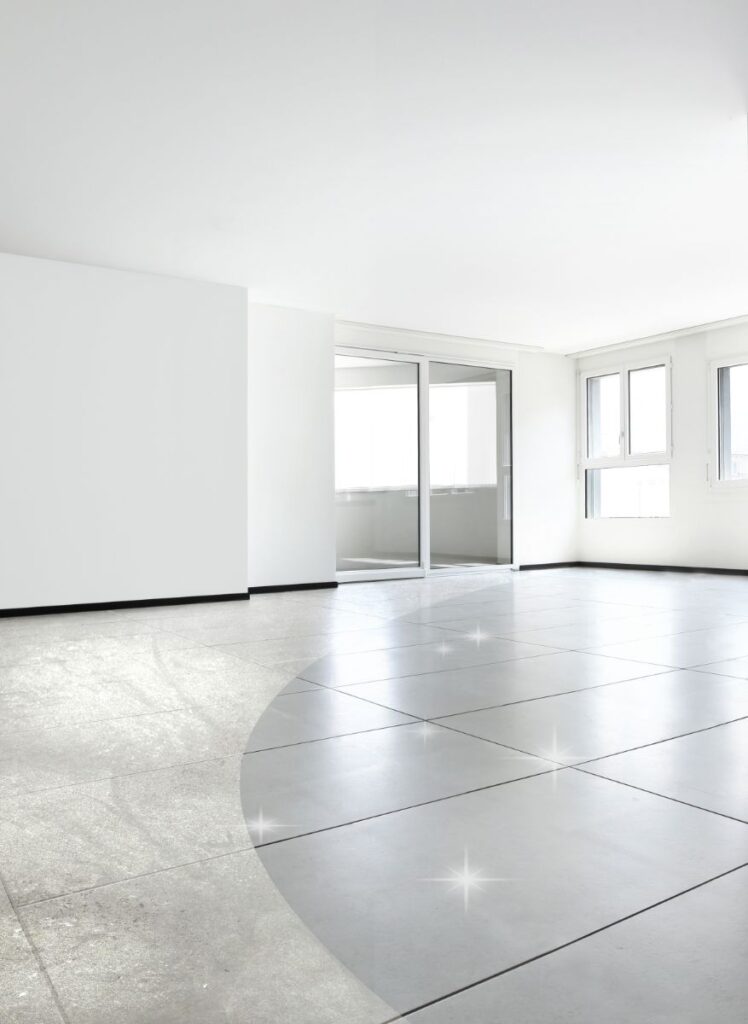
Long-term maintenance
Another important consideration is how the surface is maintained over time. Choosing the right cleaning product will ensure that daily cleaning is easy.
There is a multitude of options available when it comes to a cleaning product, but do not underestimate how important getting the choice right is. If the only consideration is a low price product, then this is very likely to cause problems quite quickly. There are many cleaning products on the market that have a “maintainer” in them, and this can quickly affect the look of a surface. These types of products leave a light film on the surface that builds up over time, and if we consider a floor that has been specified as anti-slip because it is being installed in a public area with high foot traffic, then cleaning with this type of product is the wrong choice.
These products can affect the R rating of the tile and in time could cause a slip hazard, as well as changing the look of the floor. A product such as MAPEI UltraCare Multicleaner is a product that is a sound choice, offering a highly concentrated formulation that provides very high yield, as well as very high performance. When used in its maintenance dilution, it will not leave a film or residue on the surface and it does not require rinsing.
Over time, all surfaces require a deep clean to remove the unavoidable build-up of organic dirt. This is an important aspect of maintaining a safe floor, and the choice of a high performing alkaline product is best considered for this important task. MAPEI UltraCare HD Cleaner is the perfect choice. It will efficiently break down any organic build up on the surface and restore the floor to its original condition. I refer to the earlier reference of an anti-slip tile being installed, as performing this periodic deep clean will ensure that the R rating of the tile remains and the aesthetics of floor are not compromised.
Inside-out flooring fashion
Another area of floor installation that is proving to be immensely popular is to carry the internal flooring out to external areas. We see external porcelain installed into many different scenarios, such as patios, terraces, balconies, paths, walkways and courtyards.
The cleaning and maintenance of these areas is every bit as important as the care that we take when installing internally. Externally we have the added elements of the weather to consider, and this can mean that periodic deep cleaning is required to maintain the aesthetics of the external areas, as we often see porcelain that is installed in areas with large bi-fold doors, creating the “inside-outside” feel, so it is important to maintain the appearance of the exterior as well as the interior. In terms of the Builders Clean, regular maintenance and periodic deep cleaning the process is the same as the internal installations. The additional problems that external installations throw at us are things such as rust stains on porcelain from metal flowerpots or posts, and the unavoidable build-up of moss and algae, particularly in areas that are shaded.
To tackle the problem of a rust stain on external porcelain you can use a product such as MAPEI UltraCare Acid Cleaner. It is the ideal solution to these inevitable issues. To tackle the removal of moss and algae, an alkaline product should be used and MAPEI UltraCare HD Cleaner makes the perfect choice.
If we now turn our attention to the installation of natural stone, then we have the added consideration of sealing the stone; do we choose either a natural look impregnating product or a colour intensifier?
Most stone should be treated with a protective product to provide protection from water, oil and other contaminations that can stain the stone. There are many protective products available that offer protection and some that offer protection and colour enhancement in one. As well as considering this, you should also consider if you want to apply a water-based or a solvent-based product.
Working with a water-based product, you must ensure that it is suitable for the surface finish of your stone. Not all water-based products can be applied to polished natural stone, so you must check this before going ahead with an “environmental choice” of a water-based product.
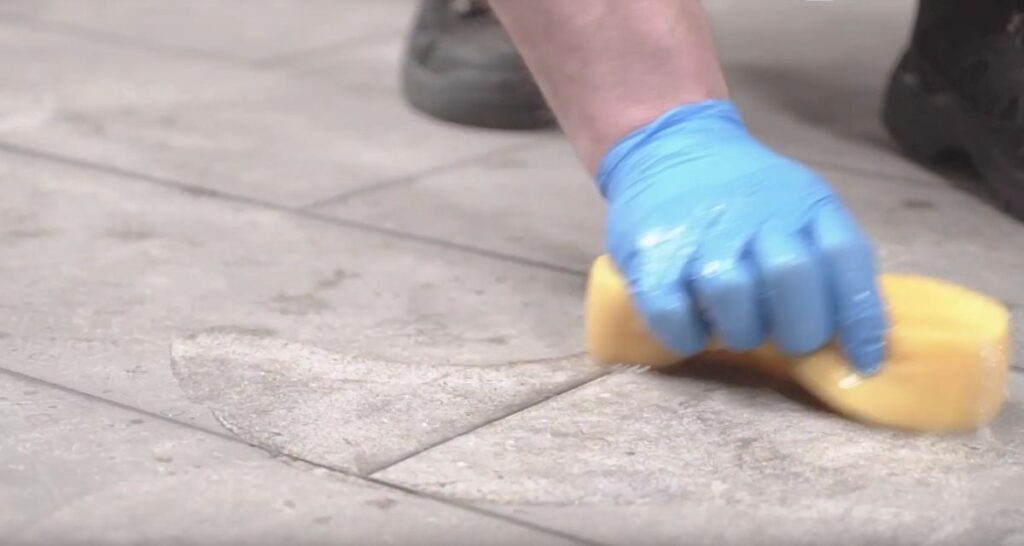
Water-based advantages
There are advantages to choosing a water-based protective product, and the most important one from an installer’s point of view is that a water-based product can be applied with residual moisture present in the stone. This can save quite a significant amount of time, because if you choose a solvent-based product, you must also take into consideration the stone’s drying time prior to application.
Understanding the natural characteristics of the stone is important; one of the first things to establish is whether the stone is sensitive to acid. This is fundamental as we can then understand the correct choice to undertake our Builders Clean. It is also imperative to understand how porous the stone is that is being installed; highly porous material, such as some limestone, require the application of a pre-grout protector. This will ensure that the grout is not absorbed into the stone, creating what is known as “picture framing” which can be really unsightly and can be easily prevented.
Once it has been established if the stone is sensitive to acid or not, we can then make the right choice of product to undertake the Builders Clean. If the stone is resistant to acid, then we can safely choose a product such as MAPEI UltraCare Acid Cleaner or MAPEI UltraCare Keranet. If we know that the stone is acid sensitive, then we should look at either an alkaline cleaning product or a pH-neutral product.
An alkaline cleaning product is perfect for unpolished natural stone and will remove any of the installation dirt and any grout residues, leaving the stone perfectly clean and ready to be treated with an impregnator. If the stone has a polished finish, a pH-neutral cleaning product such as MAPEI UltraCare Multicleaner is the perfect choice. It will efficiently remove the grout and installation residues and leave the stone ready to be treated with your chosen protective product.
Ongoing cleaning and maintenance are important considerations for natural stone. As the stone is treated with a protective product, it is vital to ensure that the protective treatment lasts as long as possible. One of the factors that determines the life cycle of a protective product is the cleaning product that is used. It is important to use a pH-neutral product, such as MAPEI UltraCare Multicleaner. This ensures that the stone is kept clean, and that the protector is not damaged by a strong alkaline cleaner as these products can reduce the protection provided by the protector and can cause staining to occur because the product has been broken down by the wrong choice of cleaning product.
Stone also requires periodic deep cleaning, and this can be undertaken with two types of product. The product choice is dependent upon the finish of the stone. For stone with a polished finish, generally a deep clean with a pH-neutral product is best. The dilution can be altered so that an effective deep clean can be undertaken. If the stone has an unpolished finish – riven, brushed, flamed, honed, etc. –an alkaline cleaning product is best.
What we can clearly see is that if we are armed with the right information, we can make the right choices in the cleaning, protecting and maintenance of all types of surface materials.
Mapei UK Ltd
Mapei House, Steelpark Road
Halesowen B62 8HD
T: 0121 508 6970
E: info@mapei.co.uk
W: www.mapei.co.uk



